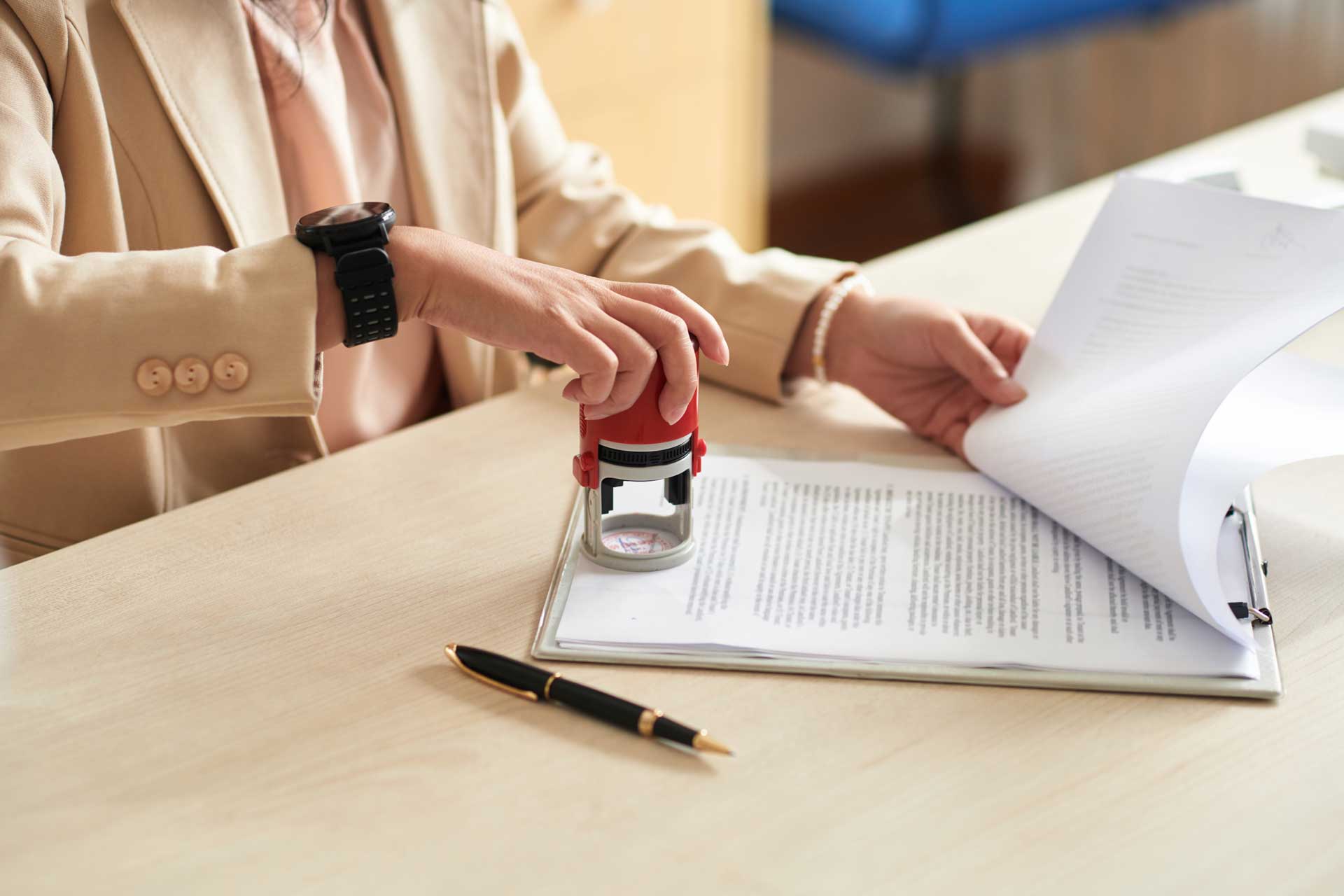Avoiding Common Notary Mistakes: What You Need to Know
Table of Contents
As a notary, you play a crucial role in verifying the authenticity of documents and protecting the public from fraud. However, even the most experienced notaries can make mistakes that compromise the legality of their notarizations.
Here’s a detailed guide to help you avoid common mistakes and maintain the highest standards of professionalism.
Inadequate Identification Verification
One of the primary duties of a notary is to verify the identity of the person signing the document. This step is crucial to prevent fraud. Always require a government-issued ID, such as a driver’s license or passport, and ensure that the person’s appearance matches the identification provided. In some states, additional steps like recording a thumbprint may be required. Failing to verify identification properly can lead to fraudulent notarizations and legal consequences.
Incomplete Notarial Acts
Completing the notarial certificate with all the required details is essential. Any missing information, such as your signature, the date, or seal, can invalidate the notarization.
Always double-check to ensure the notarial act includes your signature, seal, date, and any necessary wording or certificates. If you’re unsure about specific elements, consult your state’s notary handbook to ensure compliance.
Not Following State-Specific Guidelines
Each state has its own rules governing notarial acts. Some states require notaries to take additional steps, like administering an oath for specific documents.
Not adhering to these state-specific guidelines can lead to fines, suspension, or revocation of your notary commission. To avoid this, familiarize yourself with your state’s regulations and stay updated on any changes by attending regular training sessions or workshops.
Improperly Stamping Documents
Your notary seal is a critical component of the notarization process, but incorrect placement or illegible stamps can cause problems. Make sure to place your seal in a clear area that doesn’t obscure text. The seal should be complete, legible, and free from smudges. Regularly check that your stamp is inked correctly and meets your state’s requirements regarding size, shape, and included information.
Neglecting to Keep Accurate Records
Maintaining a detailed notary journal is recommended and required in many states. Your journal should record every notarial act you perform, including the date, type of document, signer’s name, and identification method used. Detailed records can protect you in case of legal disputes or misconduct allegations.
Even if your state does not mandate a journal, it’s a best practice to maintain one as a safeguard.
Notarizing Without the Signer Present
A notary should never notarize a document unless the signer is physically present. This rule is fundamental to ensuring the authenticity of the notarization.
Allowing a third party to sign on behalf of someone or notarizing the signer’s absence can result in severe penalties, including the loss of your commission. It’s essential to educate your clients about this requirement to avoid misunderstandings.
Unauthorized Practice of Law
As a notary, your role is limited to verifying signatures and administering oaths. Offering legal advice or selecting the type of notarial act can be construed as unauthorized law practice.
It’s essential to understand your boundaries and refrain from providing guidance that could be interpreted as legal advice. If a client needs help with legal questions, encourage them to consult a qualified attorney.
Notarizing Incomplete Documents
You should never notarize a document that contains blank spaces. These gaps can be exploited for fraud after the document has been notarized. Always review the document to ensure it is fully completed, and any corrections are made before applying for your notarial act.
If you encounter an incomplete document, ask the signer to fill in the missing information before proceeding.
Using an Expired Commission Seal
A notary seal must be current and valid at the time of notarization. Using an expired seal invalidates the document and puts you at risk for legal action. Set reminders to renew your commission before it expires, and consider joining a professional association to receive notifications about upcoming expiration dates. Always double-check that your seal is valid before each notarization.
Inadequate Security of Notary Materials
Your notary stamp, seal, and journal are critical to your professional integrity. Improper storage of these materials can lead to misuse or fraud. Keep your notary supplies in a locked drawer or safe, and never allow anyone else to use them. You protect yourself and your clients from potential misuse by ensuring that your notary materials are secure.
Failing to Stay Updated with Notary Laws
Notary laws can change, and staying informed is essential for compliance. Many states offer continuing education courses, which can help you stay current with new regulations and best practices. Joining a notary association is another effective way to keep updated, as they often provide newsletters and training sessions.
Review your state’s notary handbook and participate in educational opportunities to remain knowledgeable and compliant.
Administering Oaths Incorrectly
If an oath or affirmation is required, it must be adequately conducted to be legally binding. Administering oaths incorrectly or skipping this step can invalidate the notarization.
Familiarize yourself with the proper language and procedures for oaths, and always ensure that the signer understands the importance of this step. Properly administering oaths is essential for maintaining the legal integrity of the document.
Read More: Understanding Notary Bonds and Errors and Omissions (E&O) Insurance
Notarizing for Close Relatives
Notarizing documents for family members can create conflicts of interest and lead to questions about impartiality. While not prohibited in all states, avoiding notarizing for close relatives is generally advisable.
If you are asked to notarize for a family member, consider referring them to another notary to avoid any potential issues.
Inconsistent Record-Keeping
Even small mistakes in your notary journal can lead to problems down the line, so it’s essential to ensure each entry is complete and accurate. Here’s how to maintain a thorough record:
- Avoid Small Mistakes: Omitting details or making incomplete entries can create issues later.
- Regularly Review Entries: Make it a habit to check your journal frequently for completeness and accuracy.
- Include All Relevant Details:
- Date
- Type of Document
- Signer’s Information
- Protect Against Future Disputes: Keeping a thorough and accurate record helps safeguard you in any disputes.
Not Communicating with State Authorities
If there are any changes to your contact information or personal status, it’s crucial to update the appropriate authorities. Not communicating these changes can lead to administrative issues, such as delays in renewing your notary commission. Keeping your information current ensures you remain in good standing with your state’s notary commission office.
Protect Your Notary Practice Today
By avoiding these common mistakes, notaries can provide reliable, professional services that uphold public trust and safeguard against fraud. Regular training, adherence to state-specific guidelines, and meticulous record-keeping are vital to maintaining your reputation and ensuring the integrity of your notarial acts.
For more information on protecting yourself as a notary and staying compliant, explore the additional resources available through the Notary Public Association Resources. These materials can provide further guidance on best practices and help you refine your skills as a notary public.
Share:
Disclaimer: All information provided by Notary Public Association is for educational purposes only and is not intended as legal advice. Notary Public Association makes no representations or warranties as to the accuracy, completeness, or applicability of the information provided and assumes no liability for any actions taken in reliance on it. Always consult a licensed attorney or your local commissioning authority for guidance specific to your notary responsibilities and jurisdiction.
Related Posts

Necessary Requirements to Become a Notary
Dive into the journey of becoming a notary: understand eligibility, training, bonding, and application steps. A guide to kickstart your notary career.

California Notary Training: What to Expect
Learn what to expect from CA Notary Training: eligibility, course details, and exam prep for a successful notary career in the Golden State.

